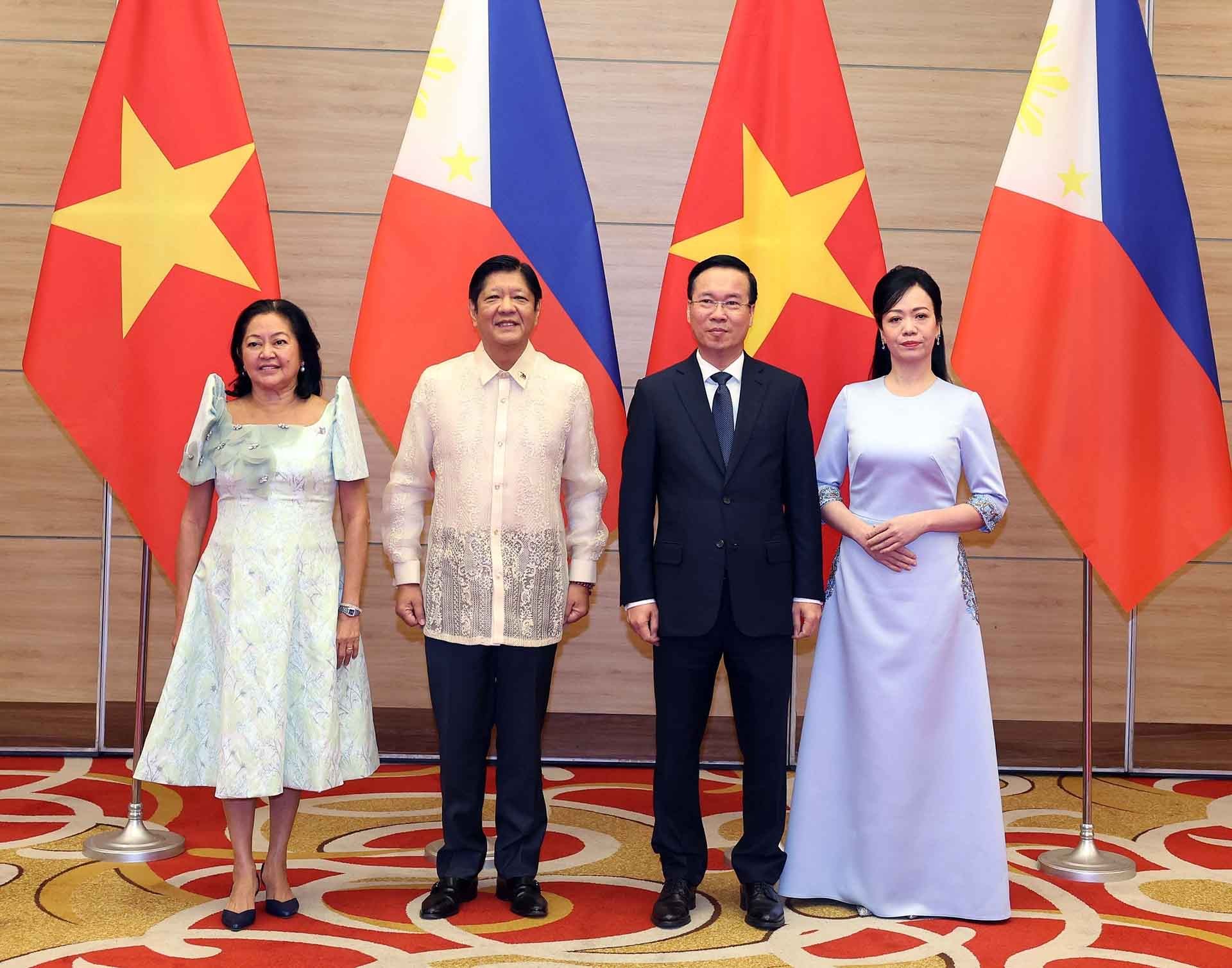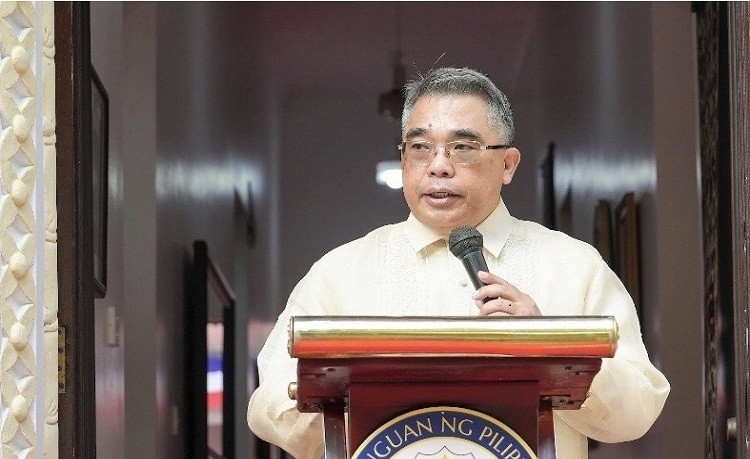
Enhancing Philippines - Vietnam relations to greater heights and always within sphere of ASEAN centrality: Philippine Ambassador
Latest
 |
| President Vo Van Thuong hosts banquet in honour of Philippine President Ferdinand R. Marcos, Jr. (Source: VNA) |
What are the most impressive results the recent visit of the President of the Philippines Ferdinand Romualdez Marcos Jr. to Vietnam (29-30/1)?
The Philippine Government considers the recently concluded State Visit of President Ferdinand R. Marcos, Jr. a resounding success. We are extremely happy for the support of all the top leaders of Vietnam, especially the Ministry of Foreign Affairs in helping ensure the success of this visit.
As you may know, there have been numerous occasions where President Marcos has had the opportunity to interact with Vietnam's top leaders through various forums. But this visit is very special for the Philippines since this provided an opportunity to have extensive and candid discussion with Vietnamese leaders on matters of utmost importance for both countries.
|
|
| Philippine Ambassador to Vietnam Meynardo Los Banos Montealegre. (Source: VNA) |
His meetings with business leaders from Vietnam with Prime Minister Pham Minh Chinh and relevant Ministers are expected to boost the momentum of our trade and investment relations and will contribute to the further integration of both economies.
During President Marcos' visit, several bilateral instruments were also concluded covering trade, agriculture, maritime and cultural cooperation. We are confident that these instruments will help fortify our relations with Viet Nam and set the trajectory of our mutual engagements on the political, economic, and socio-cultural spheres.
Certainly, President Marcos' visit to Vietnam, which is also his first official foreign visit this year, assured the highest level of commitment between our two countries towards a more extensive relationship and further integration between two fastest growing economies in the ASEAN region.
What are the new development directions of our relations in the coming time, especially in the trend of developing the digital and green economy?
There is a lot of potential for bilateral trade between the Philippines and Vietnam. Aside from both being agricultural countries, both the Philippines and Vietnam are also engaged in the semi-processing of machinery and hi-tech equipment since both countries play crucial roles in supporting the global value chain which can be explored further as the world rapidly moves towards the digitalization of basic services. In addition, many businesses from the Philippines are eager to engage with Vietnamese companies as viable sources of raw materials, machinery, and important inputs for production.
Overall, the positive economic outlook of both countries provides plenty of opportunities for more intensive trade and investment relations between our private business sectors. Our role in the Embassy is to tap the resources of our government agencies in the Philippines and here in Vietnam to provide better and more accurate information on doing trade and business in both countries.
We're also cognizant of the fact that economies around the world are prioritizing the shift to a greener economy. The Philippines, as one of the most vulnerable countries to climate change welcome this shift. Just last October, the Philippines and the EU signed the €60million Financing Agreement for the Green Economy Programme which aims to, among others, develop a circular economy and strengthen the renewable energy sector to address the impact of climate change. As Vietnam is also committed to bring net emissions to zero by 2050, I believe this is another avenue where our two countries could work together.
2024 is also the year for both countries to prepare for the 10th year anniversary of our Strategic Partnership, which will be in 2025 and the 50th anniversary of the establishment of diplomatic relations in 2026. This means that more bilateral engagements could be held this year compared to last year as we gear up for the upcoming 10th year anniversary of our Strategic Partnership with Vietnam. Cooperation on environment, tourism, education and training, and science and technology are just some of the crucial areas of cooperation that we intend to explore with Vietnam in the near future.
Rice is the main export product that creates Vietnam's position in the Philippines. Could you please share us the potentials in importing rice in particular, as well as agricultural products in general in the Philippine market?
As mentioned earlier, rice trade is topmost in the trade agenda during President Marcos' visit. The MOU on Rice Trade Cooperation that was signed during President Marcos' visit creates a five-year trade commitment for Vietnam to supply, through its private sector, white rice to the Philippine private sector, amounting to 1.5 million to 2 million metric tonnes per year at a competitive and affordable price.
Apart from rice trade, we also aim to exchange information on policies, plans and regulations, and other rice-trade related activities.The MOU on Cooperation on Agriculture and Related Fields that was also signed identifies 19 areas of cooperation between the two countries including high value crops, livestock, and aquaculture, farm management and sustainability, smart agriculture and aquaculture technology, research, training, and exchanges of experts on related areas, among others.
Within the ASEAN framework, how do you evaluate the role of the two countries in promoting the development of the ASEAN Community?
Vietnam and the Philippines have remained committed towards achieving an ASEAN region that is integrated, peaceful, and prosperous. Engagements between our two countries' Government leaders have continued in several forums and always with deep mutual respect and high regard towards the rights and interests of each other.
As the two fastest growing economies in the ASEAN region, both the Philippines and Vietnam are mutually committed to ensure free trade and to resolve barriers or concerns pertaining to trade. Within the ASEAN framework and bilaterally, both the Philippines and Vietnam also continuously cooperate in various fields such as science and technology, modern and sustainable agriculture and fisheries, education and cultural cooperation as well as issues related to climate change.
On defence and security cooperation, we are both committed to promoting the effectiveness of existing mechanisms and continue supporting each other especially in ASEAN-led mechanisms. It is primordial to emphasize that both the Philippines and Vietnam recognize the importance of adhering to international law, the peaceful resolution of disputes, the importance of maintaining open lines of communication and ensuring active dialogue - and these fundamental principles were re-affirmed by President Marcos and the Vietnamese leaders throughout their productive discussions.
This 2024, we will be taking stock of the accomplishments of the second five-year Plan of Action on the Implementation of the Philippines-Vietnam Strategic Partnership and begin the necessary preparatory works for the crafting of the third five-year Plan of Action for the period 2025-2029, which will serve as a guide for our deeper commitment and the future trajectory of our bilateral relationship to help bring our diplomatic relationship to greater heights and always within the sphere of ASEAN centrality.













